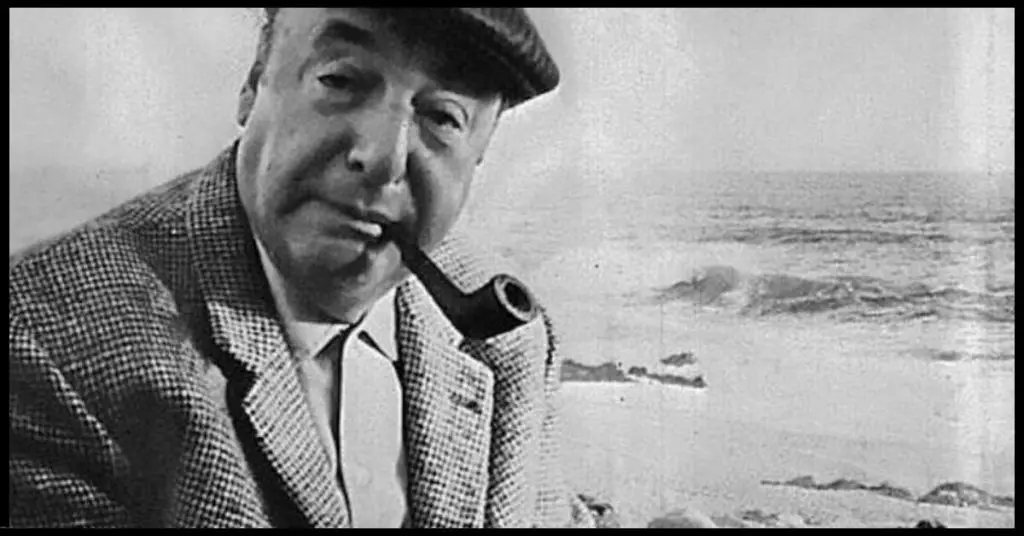Pablo Neruda Poems

You’re in for a surprise! We’ve gathered five of Pablo Neruda’s most famous and celebrated poems, and we’re confident you’ll enjoy them.
The Chilean poet’s poems are known for their powerful and evocative language, as well as their ability to convey deep emotions and feelings of love.
Some of Neruda’s most famous works, such as “Sonnet XVII” and “I Love You Without Knowing How, When, or From Where,” are included in the collection.
So sit back, relax, and enjoy the magic of love and life as expressed in the eloquent words of Pablo Neruda.
Table of Contents
Affiliate Disclaimer: This content contains affiliate links. When you buy through these links, I may earn an affiliate commission.
Introduction to Pablo Neruda
If you’re unfamiliar with Pablo Neruda’s poetry, you’re in for a real treat! Chilean poet Pablo Neruda wrote some of the most beautiful and evocative poetry in Spanish.
His poems are known for their ability to elicit strong emotions and feelings, as well as convey the enchantment and beauty of love and life.
If you’re looking for a collection of poems that will transport you to a world of love and magic, this anthology is for you!
Sonnet XVII
“Sonnet XVII” is one of Pablo Neruda’s most famous and celebrated love poems. It is known for its powerful and evocative language, and its ability to convey deep emotions and feelings of love.
The poem is written in the form of a sonnet, a type of poem that is often used for love poetry. It is written in the second person as if Neruda is speaking directly to his loved one.
The poem is full of beautiful imagery, and it captures the intense emotions of love perfectly. It is a wonderfully romantic poem, and it is sure to touch your heart.
Read the full poem below:
I do not love you as if you were salt-rose, or topaz, or the arrow of carnations the fire shoots off. I love you as certain dark things are to be loved, in secret, between the shadow and the soul. I love you as the plant that never blooms but carries in itself the light of hidden flowers; thanks to your love a certain solid fragrance, risen from the earth, lives darkly in my body. I love you without knowing how, or when, or from where. I love you straightforwardly, without complexities or pride; so I love you because I know no other way than this: where I does not exist, nor you, so close that your hand on my chest is my hand, so close that your eyes close as I fall asleep.
I Love You Without Knowing How
The poem “I Love You Without Knowing How” by Pablo Neruda provides a concise yet insightful exploration of the depths of emotion involved in romantic love.
He uses lyricism to express his feelings in an understandable and relatable manner using expressive and evocative language.
The central idea of the poem is that sharing love authentically does not require understanding all of its complexities. See the full poem below:
I don’t love you as if you were a rose of salt, topaz,
or arrow of carnations that propagate fire:
I love you as one loves certain obscure things,
secretly, between the shadow and the soul.
I love you as the plant that doesn’t bloom but carries
the light of those flowers, hidden, within itself,
and thanks to your love the tight aroma that arose
from the earth lives dimly in my body.
I love you without knowing how, or when, or from where,
I love you directly without problems or pride:
I love you like this because I don’t know any other way
to love,
except in this form in which I am not nor are you,
so close that your hand upon my chest is mine,
so close that your eyes close with my dreams.
A dog has died
In this poem, Neruda brilliantly illustrates lyrical realism and demonstrates his aptitude for succinctly capturing the gravity and melancholy of a single moment in time.
The poem is a monologue in which each line reveals a different aspect of the speaker’s grief over the death of their cherished pet.
Neruda skillfully captures the narrator’s sense of grief as they struggle to accept their loss through their simple language. The full poem can be read below:
My dog has died. I buried him in the garden next to a rusted old machine. Some day I'll join him right there, but now he's gone with his shaggy coat, his bad manners and his cold nose, and I, the materialist, who never believed in any promised heaven in the sky for any human being, I believe in a heaven I'll never enter. Yes, I believe in a heaven for all dogdom where my dog waits for my arrival waving his fan-like tail in friendship. Ai, I'll not speak of sadness here on earth, of having lost a companion who was never servile. His friendship for me, like that of a porcupine withholding its authority, was the friendship of a star, aloof, with no more intimacy than was called for, with no exaggerations: he never climbed all over my clothes filling me full of his hair or his mange, he never rubbed up against my knee like other dogs obsessed with sex. No, my dog used to gaze at me, paying me the attention I need, the attention required to make a vain person like me understand that, being a dog, he was wasting time, but, with those eyes so much purer than mine, he'd keep on gazing at me with a look that reserved for me alone all his sweet and shaggy life, always near me, never troubling me, and asking nothing. Ai, how many times have I envied his tail as we walked together on the shores of the sea in the lonely winter of Isla Negra where the wintering birds filled the sky and my hairy dog was jumping about full of the voltage of the sea's movement: my wandering dog, sniffing away with his golden tail held high, face to face with the ocean's spray. Joyful, joyful, joyful, as only dogs know how to be happy with only the autonomy of their shameless spirit. There are no good-byes for my dog who has died, and we don't now and never did lie to each other. So now he's gone and I buried him, and that's all there is to it.
Tonight I Can Write (The Saddest Lines)
The poem “Tonight I Can Write (The Saddest Lines)” by Pablo Neruda is a potent examination of the nature of human longing.
He captures a deep yearning for connection and comprehension while highlighting the fragility of life through the power of his words.
Neruda’s command of poetic expression is demonstrated by his use of lyrical language to heighten the melancholy tone of the poem.
Tonight I can write the saddest lines. Write, for example, 'The night is starry and the stars are blue and shiver in the distance.' The night wind revolves in the sky and sings. Tonight I can write the saddest lines. I loved her, and sometimes she loved me too. Through nights like this one I held her in my arms. I kissed her again and again under the endless sky. She loved me, sometimes I loved her too. How could one not have loved her great still eyes. Tonight I can write the saddest lines. To think that I do not have her. To feel that I have lost her. To hear the immense night, still more immense without her. And the verse falls to the soul like dew to the pasture. What does it matter that my love could not keep her. The night is starry and she is not with me. This is all. In the distance someone is singing. In the distance. My soul is not satisfied that it has lost her. My sight tries to find her as though to bring her closer. My heart looks for her, and she is not with me. The same night whitening the same trees. We, of that time, are no longer the same. I no longer love her, that's certain, but how I loved her. My voice tried to find the wind to touch her hearing. Another's. She will be another's. As she was before my kisses. Her voice, her bright body. Her infinite eyes. I no longer love her, that's certain, but maybe I love her. Love is so short, forgetting is so long. Because through nights like this one I held her in my arms my soul is not satisfied that it has lost her. Though this be the last pain that she makes me suffer and these the last verses that I write for her.
If You Forget Me
Pablo Neruda’s poem, ‘If You Forget Me,’ is an eloquent exploration of abandonment and the emotional toll it takes on the speaker.
The poem utilizes a variety of structural devices, including personification and extended metaphor, to evoke the narrator’s raw and desperate longing for reconciliation with his beloved.
In particular, the poem’s refrain – ‘I want you to know one thing’ – serves to emphasize the intensity of the speaker’s plea for recognition. Read the poem below:
I want you to know one thing. You know how this is: if I look at the crystal moon, at the red branch of the slow autumn at my window, if I touch near the fire the impalpable ash or the wrinkled body of the log, everything carries me to you, as if everything that exists, aromas, light, metals, were little boats that sail toward those isles of yours that wait for me. Well, now, if little by little you stop loving me I shall stop loving you little by little. If suddenly you forget me do not look for me, for I shall already have forgotten you. If you think it long and mad, the wind of banners that passes through my life, and you decide to leave me at the shore of the heart where I have roots, remember that on that day, at that hour, I shall lift my arms and my roots will set off to seek another land. But if each day, each hour, you feel that you are destined for me with implacable sweetness, if each day a flower climbs up to your lips to seek me, ah my love, ah my own, in me all that fire is repeated, in me nothing is extinguished or forgotten, my love feeds on your love, beloved, and as long as you live it will be in your arms without leaving mine.
F.A.Qs. About Pablo Neruda Poems:
- What is Pablo Neruda’s most famous poem?
Twenty Love Poems and a Song of Despair, written by Pablo Neruda, is his most well-known poem. It was released in 1924.
- Why is Pablo Neruda so important?
Pablo Neruda’s eloquent and emotive writing, which perfectly captured the political and social struggles of his era, has earned him recognition as one of the most significant poets of the 20th century.
- Why was Pablo Neruda controversial?
Because of his communist political beliefs and support for socialist movements during a period of political unrest in Chile, Pablo Neruda generated controversy.
- What were Pablo Neruda poems about?
Themes of individual and group identity were frequently explored in Pablo Neruda’s poems, which were often about love, nature, politics, and social justice.
Final Thoughts on Pablo Neruda’s Poems
Pablo Neruda’s poetry demonstrates the strength of love and the human spirit. Neruda captures the complexity and beauty of human experience with vivid imagery and emotive language.
His poems celebrate love, life, and nature and remind us to appreciate the present and our loved ones. Whether you’re reading Neruda’s poetry for the first time or again, you’ll be moved by its depth and passion. Pablo Neruda’s poetry will continue to inspire generations.




Leave a Reply